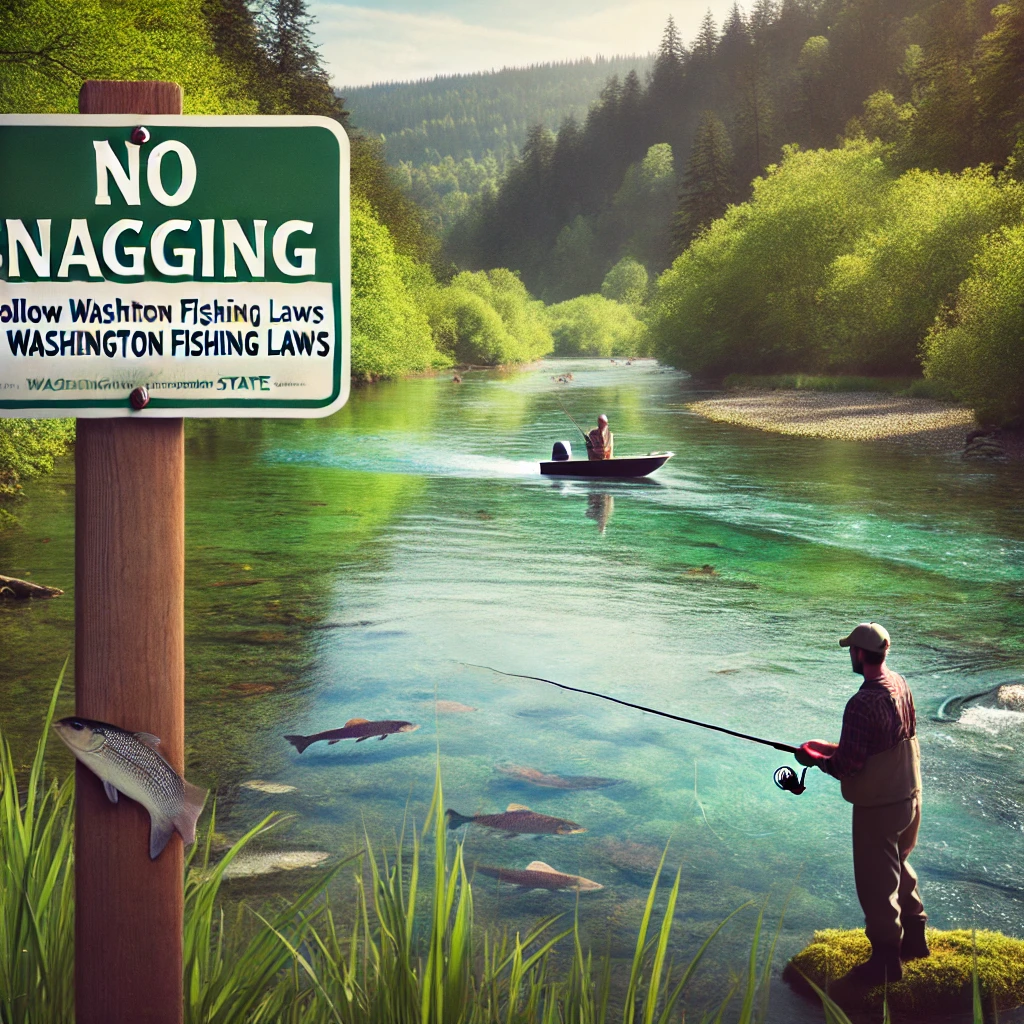WAC 220-300-160 defines various fishing practices and regulations in Washington State, with a key focus on the prohibition of snagging. Snagging is an illegal fishing method that involves hooking a fish anywhere on its body, rather than in its mouth, as required by Washington fishing laws. Understanding this regulation is essential for ethical anglers and those looking to avoid penalties under the state’s fishing regulations.
What is Snagging?
In the context of Washington fishing regulations, snagging refers to the act of attempting to hook a fish in any part of its body other than its mouth. This method is illegal under WAC 220-300-160 because it often leads to unnecessary injury or death of fish that may not be intended for capture, such as those not in season or protected species.
Snagging is most commonly seen when fish are abundant, particularly during spawning seasons, where some anglers use this prohibited fishing method to quickly capture fish. This practice violates the principles of ethical angling by eliminating the skill and fair play involved in legal fishing methods.
Why Snagging is Illegal in Washington
The primary reasons snagging is prohibited under Washington fishing laws are related to conservation, sustainability, and ethics:
- Fish Conservation: Snagging can harm fish populations, especially those that are not legal to catch. Fish that are snagged improperly may die or become unable to reproduce, impacting fish conservation efforts.
- Sustainable Fishing: Legal fishing methods, where fish are hooked in the mouth, support sustainable fishingpractices. Prohibiting snagging helps maintain healthy fish populations and ensures they are available for future generations.
- Ethical Fishing Practices: Snagging violates the principles of ethical angling by removing the skill involved in getting fish to bite bait and rewarding a method that harms fish unnecessarily.
Penalties for Snagging in Washington
Violating WAC 220-300-160 and using snagging as a method of fishing can lead to significant consequences. Penalties include fines, the loss of fishing licenses, and potential legal action under Washington fishing laws. These regulations are enforced to protect wildlife and maintain healthy ecosystems.
How to Avoid Snagging and Fish Responsibly
To avoid violating Washington’s illegal fishing laws, anglers should:
- Use legal fishing methods that ensure the fish is hooked in the mouth.
- Practice sustainable fishing by following local fishing regulations and being mindful of protected species.
- Always stay informed on current fishing regulations to avoid unintentional violations.
If you are uncertain about Washington’s fishing regulations or encounter legal issues, consulting an attorney experienced in Washington wildlife laws can help protect your rights.
For a comprehensive look at the regulations on snagging and other prohibited fishing methods, you can read WAC 220-300-160.
Conclusion
Snagging is an illegal fishing practice in Washington State, as defined under WAC 220-300-160. This method not only harms fish populations but also goes against the principles of ethical angling and sustainable fishing. By understanding and following Washington fishing laws, anglers can contribute to the conservation of the state’s rich aquatic ecosystems while avoiding penalties. Always fish responsibly and within the law to preserve the joy of fishing for future generations.
Explore Our Client Resources
Review our comprehensive client resources here for valuable legal guidance. For urgent legal needs, don’t hesitate to contact us anytime.
About Blanford Law
At Blanford Law, we pride ourselves on being relentless, fair, and honest. With over 20 years of experience, Ken Blanford has built this firm on the belief that everyone deserves the best legal representation, no matter the circumstances. We prioritize listening to our clients rather than fast-talking, ensuring you receive respect without assumptions or preconceived notions.
If you or a loved one is facing criminal charges or has been injured due to someone else’s negligence, contact us today at 253-720-9304 or email us at info@blanfordlaw.com for a consultation. We’re here to help you navigate your legal challenges with expertise and care.

Additional Resources
For further reading on related topics, explore these articles:
- What is the Washington Administrative Code (WAC)?
Gain a deeper understanding of the Washington Administrative Code (WAC) and how it governs various aspects of law and regulations within the state. This article breaks down what the WAC is and why it matters for Washington residents. - Addressing Whidbey Island’s Deer Collision Crisis: A Call for Harmony Between Wildlife and Drivers
Explore the increasing issue of deer collisions on Whidbey Island and the measures being taken to protect both wildlife and drivers. This article highlights potential strategies to reduce accidents and foster coexistence with local wildlife. - Whidbey Island’s Deer Dilemma: Addressing Wildlife-Vehicle Collisions
Learn about the growing concern of wildlife-vehicle collisions on Whidbey Island and what can be done to minimize these incidents. This article provides insights into prevention methods and legal considerations for drivers. - Maximizing Protection: Unpacking WAC 284-20-300 for Auto Insurance Policyholders – How Do You WaiveUIM or PIP?
Understand the critical details of WAC 284-20-300, focusing on how policyholders can waive Underinsured Motorist (UIM) or Personal Injury Protection (PIP) coverage in Washington State. This guide explains how to ensure your auto insurance policy offers maximum protection. - Reducing Wildlife Collisions: Strategies and Insights from Washington State
Discover effective strategies for reducing wildlife collisions in Washington State. This article outlines practical tips and legal considerations for drivers, offering valuable insights to help protect both wildlife and road users.
